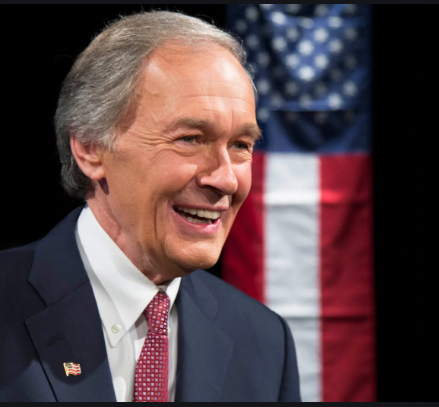The following is a media release from Sen. Ed Markey, who was elected by voters in the Commonwealth of Massachusetts to serve the state in Washington DC in the US Senate. He is a Democrat.
***
[broadstreet zone=”80100″]
BOSTON – Senator Edward J. Markey (D-Mass.), a member of the Commerce, Science, and Transportation Committee and Environment and Public Works Committee, today commended the House of Representatives’ passage of the Moving Forward Act (H.R.2).
The comprehensive legislation contains many of Senator Markey’s provisions related to broadband connectivity, air travel health standards, public transit affordability, climate-friendly infrastructure, and more.
“Infrastructure is the lifeblood of America’s economy and will be key to rebuilding from the coronavirus crisis,” said Senator Markey. “Unfortunately, our transit systems, roads, rail, water, and broadband infrastructure are all aging and in need of significant investment. Providing robust funding for new infrastructure projects – with a focus on equity, safety, and the environment – will be a critical stimulus that can put people back to work and strengthen the networks that support commerce and transportation in our recovery. I applaud the House of Representatives for taking action on such a critical bill, and for including many of my provisions in their legislation. I will continue fighting in the Senate until these essential policies, and more, become law.”
[broadstreet zone=”59948″]
Senator Markey’s provisions incorporated into the House’s Moving Forward Act include:
- E-Rate and Distance Learning: Establishes a grant program at the FCC, using the authorities that established the E-Rate program, for schools and libraries to fund broadband connectivity for students to learn online during and after the coronavirus pandemic.
- Task Force on Air Travel Health and Safety: Directs the Departments of Transportation, Health and Human Services, and Homeland Security to establish a joint task force – advised by aviation, security and public health experts – that will develop recommended requirements, plans, and guidelines to ensure safe and healthy air travel during and after the coronavirus pandemic.
- Complete Streets Planning: Revises roadway design standards to require consideration of all users of a transportation facility, ensuring that pedestrians, bicyclists, public transit users, children, older individuals, individuals with disabilities, motorists, and freight vehicles can all move around safely.
- Connecting Active Transportation Systems: Establishes a new grant program to connect walking and biking infrastructure into more robust active transportation networks that will allow people to travel within a community and between communities without ever using a car.
- Transit Justice: Creates a demonstration grant to help close public transit equity gaps by supporting reduced fares for low-income riders.

- GREEN Streets: Requires the Department of Transportation to establish new performance measures for reducing greenhouse gas emissions in the transportation sector.
- Offshore Wind Jobs and Opportunity: Authorizes a new grant program to help institutions of higher education and labor unions provide training opportunities for jobs in the offshore wind industry.
- National Climate Bank: Establishes a “Clean Energy and Sustainability Accelerator” that will leverage public and private funds to bolster and expand a robust clean energy workforce, deploy emissions reduction technologies, and invest in low-carbon infrastructure projects.
- Offshore Wind Tax Credit: Extends a 30 percent investment tax credit for offshore wind facilities through the end of 2025.
[broadstreet zone=”53820″]

